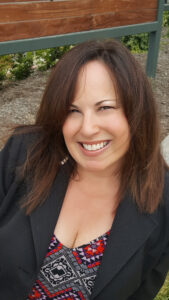Attaining a sense of community through a virtual event is quite an achievement. I wasn’t sure what to expect when I signed up to attend the American Brain Tumor Association’s 2020 Virtual National Conference which was made possible this year thanks to sponsors such as The Sontag Foundation, Agios, and Novocure. Click here to see the complete sponsor list.
The event co-chairs; Mark R. Gilbert, MD, and Jean Arzbaecher, RN, APN, CNRN together with the ABTA staff did a terrific job of presenting a meaningful, engaging, and educational conference which was paced just right (in my humble opinion). In addition to feeling cared for as a member of the brain tumor community, I gleaned several key pieces of information. Typically, I take a lot of notes but in this case, I just wanted to relax in the comfort of my home and absorb as much as possible. I noticed the sessions were being recorded and I’m told the conference will be posted on the ABTA website in the near future. I look forward to reviewing the sessions again and I hope you will too.
I’ve only attended one other ABTA National Brain Tumor Conference and that was at UCLA in 2015 — just after my craniotomy. Although I was newly diagnosed and emotional, I still recall a few of the sessions. I have wanted to attend every year since but it wasn’t possible for me to physically be there. So, in essence, the virtual format really worked for me this year making it possible for me to participate. The following were the five sessions that resonated most for me:
1. Brain Tumor Network (BTN): Guiding and Empowering Patients and Caregivers. I wasn’t aware of this resource prior to the conference and I have since added the BTN to my resources page. Two of the BTN’s team members; Stephanie Gebhardt, DNP, APRN, and Eden C. Mock, MSW, OPN-CGd spoke about patient navigation and psychosocial support. The BTN is a nonprofit organization and its mission “is to provide compassionate and personalized high-touch navigation to adult patients and caregivers in the United States who seek information about treatment options for primary brain tumors beyond the standard of care.” It was formed in 2014 and has an interesting history. The services are provided at no cost to patients, caregivers, or healthcare providers.
2. Brain Tumor Board. This was a very interesting session facilitated by event co-chair, Mark R. Gilbert, MD. Mark represents the Center for Cancer Research, the National Cancer Institute, and the National Institutes of Health. Many brain tumor patients have heard the words, “we’ll need to discuss the next course of treatment with the brain tumor board.” This was a behind the scenes look that provided insight into which professionals could be on a brain tumor board and the kinds of discussions they would have. Mark displayed multiple MRI scans and discussed the cases with a panel that consisted of medical professionals from the Mayo Clinic, University of San Francisco, Anderson Cancer Center, Hospital for Sick Children at the University of Toronto, and the Cleveland Clinic.
3. The Importance of Patient Outcomes Assessments in Determining Optimal Treatment. This session was led by Terri S. Armstrong, PhD., AnP-BC, FAAN, FAANP, Center for Cancer Research, National Cancer Institute. Terri spoke about the importance of documenting symptoms and measuring them against the initial treatment plan. She spoke about balancing quality of life concerns and shared NIH studies. Most exciting was learning that an app called “My Stori” is being created and will be coming out in 2021. This app will help patients to track symptoms and better communicate with doctors.
4. Meet the ABTA Board of Directors. This was a delightful way of getting to know the volunteers who serve as ABTA board members. Jim Reilly, ABTA Board Chair kicked off the session and introduced us to six of the eight directors. They each explained why they are involved and it was interesting to learn that two of the six are brain tumor survivors. One is currently going through treatment. I really got the impression that they are a cohesive group with mutual respect for one another. I’m sure I speak for many when I say their leadership, involvement, and continued commitment is very much appreciated.
5. Living with a Brain Tumor: Patient and Caregiver Panel. This was another compelling session. It was facilitated by Jean Arzbaecher, RN, APN, CNRN, The University of Illinois at Chicago. Three sets of patients and their caregivers served as panelists. They shared their experiences and answered questions. I really like these kinds of sessions because patients like me can get a lot of validation and learn from the real-life experiences of others.

Image copied from ABTA.orgOf course, the highlight of the conference was the Keynote Session with Maria Menounos: Embodying the Role of Caregiver and Patient. Maria was interviewed by Mindee Plugues (ABTA Board Member and Chair of the Mission Committee). Having attended various kinds of conferences in the past, I misread the words Keynote Session and assumed it was going to be a Keynote Speech. I was pleasantly surprised and ended up really enjoying the format of Mindee interviewing Maria. Maria spoke about how her training as an investigative journalist helped her to record details from the meetings she participated in as a caregiver with doctors and oncology teams as she was supporting her mother after receiving a Glioblastoma diagnosis. Maria then had to apply the same skills as a patient after she received her own diagnosis of a Meningioma. Maria shared great insights into the lessons she has learned. She mentioned her podcast, “Better Together with Maria Menounos” and spoke about the benefits of combining eastern and western medicine. She shared tips for activating both sides of the brain so that the brain doesn’t shut down from fear and anxiety. Additionally, she spoke about coping through humor and reminded us that, “life is happening for you and not to you.” I am now following Maria on Instagram @mariamenounos.
Congratulations to the ABTA on a job well done and thank you for the important work you do. I look forward to seeing what next year’s national conference brings.


 Hello. My name is Wendy and I’m a recovering workaholic. I'm also a brain tumor/cancer survivor.
The purpose of this blog is to share my experiences, memories, resources, and self-discoveries as I continue to transform from a workaholic into a more balanced person. I have read several books and stories about others who have had similar experiences
Hello. My name is Wendy and I’m a recovering workaholic. I'm also a brain tumor/cancer survivor.
The purpose of this blog is to share my experiences, memories, resources, and self-discoveries as I continue to transform from a workaholic into a more balanced person. I have read several books and stories about others who have had similar experiences 